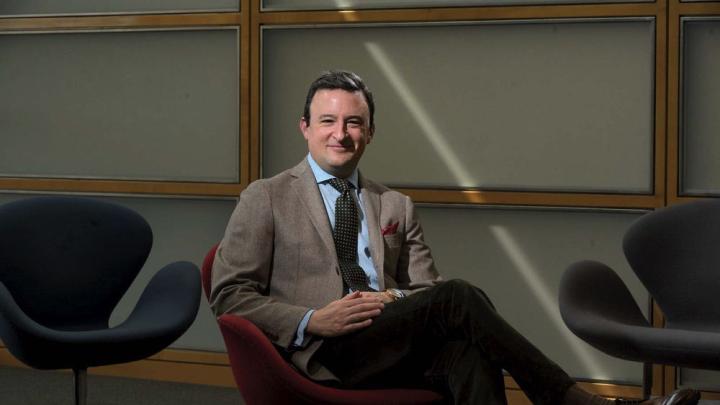A central tenet of modern liberal political philosophy is that individuals can be governed only by consent. But both the nature of this consent and the conditions under which it may be obtained have been debated for centuries. In his new book, The Theology of Liberalism (Harvard University Press), Beren professor of government Eric M. Nelson enters that debate, positing that liberalism took a “fateful wrong turn” in the 1970s. The problem, he argues, emerged because liberal thinkers forgot their metaphysical roots.
Liberal thought, Nelson writes, sprang from answers to a longstanding problem for Christianity: how can suffering and injustice exist in the world if God is both good and all-powerful? The orthodox position, which Saint Augustine championed, blames human sin. Humans cannot choose to be good, and the world’s ills follow from their unavoidable errors. A dissenting group, the Pelagians, asserted instead that “human beings are fully able to choose” to be good. In that case, humans can be held accountable for the results of their actions—but if they choose correct conduct, they can merit salvation. As Nelson explained in an interview, liberalism is “downstream of all that,” hinging on the Pelagian concept of humans as freely choosing agents. From that point follow contracts, democratic political representation, and the notion of both accountability and reward for our decisions.
In the 1970s, John Rawls initiated a rejection of this brand of liberalism. Before becoming a philosopher, he had studied theology, planning to join the priesthood. His undergraduate thesis, which sparked Nelson’s project, dealt explicitly with the question of how and whether humans can be redeemed in a religious sense. An anti-Pelagian, Rawls first denied the possibility of meriting salvation, and then maintained this denial of merit, even after abandoning religion.
Modern, Rawlsian liberals, unknowingly drawing from this theological debate, hold that a person’s actions are most often “arbitrary from a moral point of view” because they are contingent on circumstance. Humans do not choose their birth families or the traits they inherit, so how can they deserve any consequent benefits? A truly fair society, such thinkers claim, would eliminate all such unmerited differences. Only then could individuals be free to consent to liberal government.
“What we are really asking is whether a world characterized by the existing distribution of natural endowments…is the best of all possible worlds.”
The problem, Nelson argues, is that humans cannot claim to know what perfect equality would entail. “For what we are really asking,” he expanded in the interview, “is whether a world characterized by the existing distribution of natural endowments among human beings is, from the point of view of justice, the best of all possible worlds.” While most modern liberal philosophers would say no, Nelson writes that he sees no way to know for sure.
Religious faith, he says, can provide an answer: those Christians, for example, who believe their God is perfectly just, and the world is decidedly fallen, can answer that a better world than this one must exist. But without such beliefs, the question is harder to answer.
Equally difficult is the problem of whether leveling advantages, as Rawlsian liberalism advocates, could alter someone’s character unrecognizably. A man with brown hair may remain the same person if he dyes his hair red, or even if a pill turns his hair blond. But what if the government gave him a pill to change his personality, making him smarter and easier to work with? If he is not the same man, it seems difficult to say that the original individual has benefitted.
Nelson worries that attempts to answer such questions breed illiberal attitudes, both in academic circles and in the general public. Intelligence pills may be an esoteric example, but he argues that many liberals advocate redistributing wealth or eliminating educational selectivity based on the same denial of merit. Such liberals, he has noticed, increasingly assume they know what is best for others. More pointedly, he offers, it seems counterintuitive to uphold free choice by forcibly redistributing wealth.
If these arguments read like veiled attacks on egalitarianism, Nelson insisted during the interview that they are not. “We can agree to distribute all kinds of ways, for all kinds of reasons,” he emphasized. If one accepts that economic inequality breeds political instability, for example, “that’s a very good reason to mitigate inequality.” His book critiques the idea that liberalism requires redistribution, not redistribution itself. The two ideas can coexist, and often do, “but they needn’t.” Their exact relationship, absent a link of necessity, becomes “a matter of fine-grained judgment about what kind of society we want to live in.”
A modern, Rawlsian liberal might expect policy decisions to point toward a perfect equality in which all individuals can participate as equals in a liberal state. But as Nelson counters, “It’s not that there’s some kind of cosmic verdict that will tell us what tax policy should be.”
By returning to a Pelagian appreciation for human choice and accountability, he believes liberalism can avoid the difficulties of attempting to ascertain such a cosmic verdict. Governments can compel egalitarian redistributions so long as their subjects consent to be governed in that way, even if an individual’s consent entails mere participation in the society the government administers. Consent need not be necessary for each action the government takes, Nelson suggests. The key lies in respecting the individual’s original consent to be governed.








